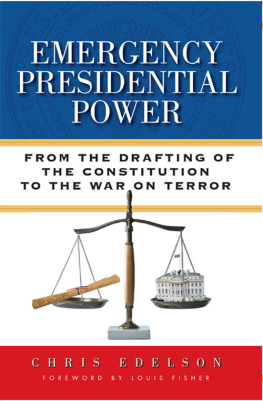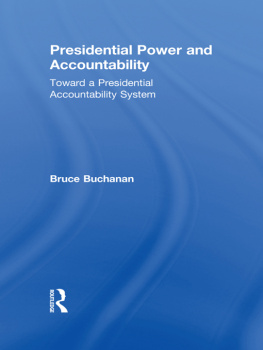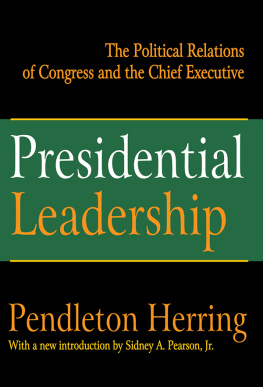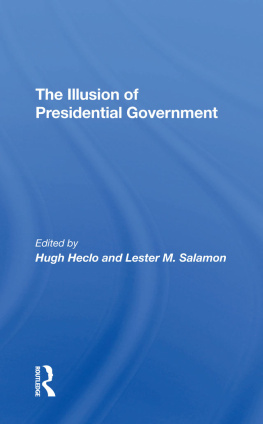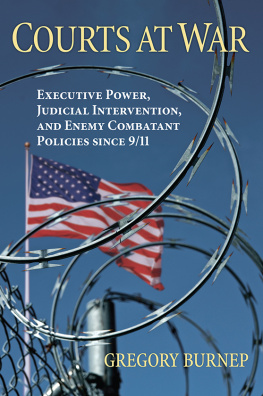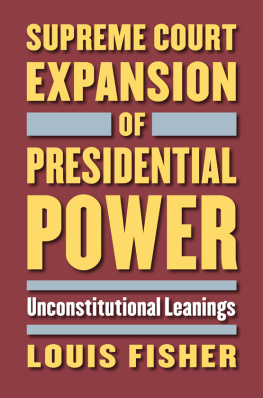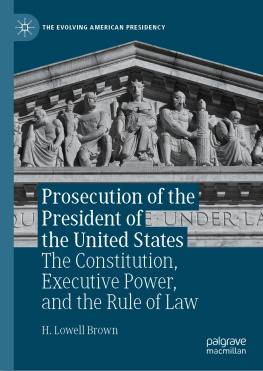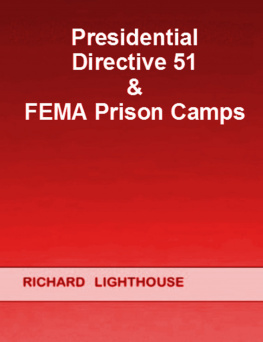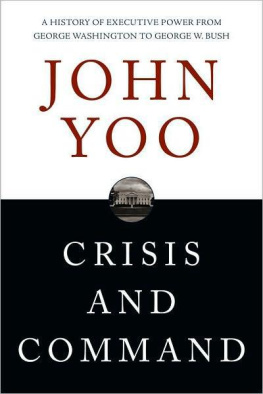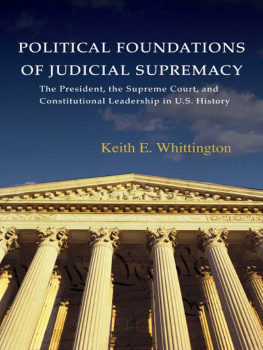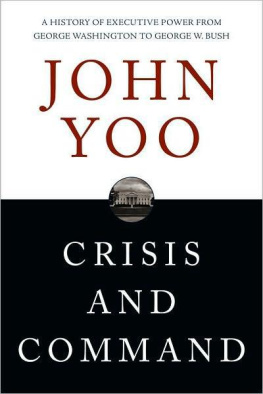THE NEED FOR THIS BOOK
WAS ANTICIPATED BY A GRANT
FIGURE FOUNDATION
EMERGENCY
PRESIDENTIAL
POWER
FROM THE DRAFTING OF
THE CONSTITUTION TO
THE WAR ON TERROR
CHRIS EDELSON
The University of Wisconsin Press
The University of Wisconsin Press
1930 Monroe Street, 3rd Floor
Madison, Wisconsin 53711-2059
uwpress.wisc.edu
3 Henrietta Street
London WC2E 8LU, England
eurospanbookstore.com
Copyright 2013
The Board of Regents of the University of Wisconsin System
All rights reserved. No part of this publication may be reproduced, stored in a retrieval system, or transmitted, in any format or by any means, digital, electronic, mechanical, photocopying, recording, or otherwise, or conveyed via the Internet or a website without written permission of the University of Wisconsin Press, except in the case of brief quotations embedded in critical articles and reviews.
Printed in the United States of America
Library of Congress Cataloging-in-Publication Data
Edelson, Chris.
Emergency presidential power: from the drafting of the Constitution
to the War on Terror / Chris Edelson.
p. cm.
Includes bibliographical references and index.
ISBN 978-0-299-29530-1 (cloth: alk. paper)
ISBN 978-0-299-29533-2 (e-book)
1. War and emergency powersUnited States.
2. Executive powerUnited States.
3. War on Terrorism, 20012009.
I. Title.
JK558.E34 2013
352.235dc23
2013010416
For
KITS
the only one Id trust with absolute power
Contents
Foreword
Louis Fisher
In this book Chris Edelson confronts the growing independence of presidents over what he calls emergency power: power related to national security, foreign policy, and war that responds to claims of an imminent threat or crisis. This type of presidential power is dangerous, especially when presidents act unilaterally, in secret, and on the basis of false, deceptive, and unreliable information.
Beginning with President Trumans use of military force against North Korea in June 1950, presidents have systematically circumvented Congress, violated statutes and the Constitution, and undermined democratic government. Even before Truman, presidents invoked threats to national securitysometimes real, sometimes exaggeratedto justify emergency power. Sometimes they acknowledged constitutional checks and balances. For example, President Lincoln sought retroactive congressional approval to make legal the actions he took at the beginning of the Civil War. At other times, presidents claimed power that could not be checked by other branches.
Presidents who concentrate power in the executive branch threaten the rule of law, the system of checks and balances, and individual rights. Post-9/11 presidents have been among the worst offenders. Among the wrongs that result from these presidential initiatives: claiming that support from the UN Security Council and NATO countries is a constitutional substitute for authority from Congress, detaining suspects (including U.S. citizens) without charging them and subjecting them to trial, using torture during interrogations, conducting warrantless surveillance, and relying on secret legal memos to carry out targeted killing without judicial process or legislative controls. Unilateral executive actions regularly inflict harm on the nation and the political system. Eventually they come at a high cost to presidents and their parties.
Emergency Presidential Power: From the Drafting of the Constitution to the War on Terror offers important assistance in understanding the legitimate sources and limits of executive power. It sheds light on emerging legal and political issues that flow from inflated claims of presidential power. The need to heighten our understanding applies not merely to public officials and specialists. It must reach the general public. Without that knowledge the aspiration for self-government through elected officials is in jeopardy. Although the United States frequently announces its desire to spread democracy to other countries, there is serious concern about the health and future of democracy at home.
Edelson provides the foundation for understanding the dangers of presidential power by presenting in clear terms the constitutional principles that were established in 1787 and how they apply to political decisions today. It is often argued that the Framers decision to adopt eighteenth-century principles has no application to contemporary times. Yet the Framers fully appreciated the dangers of unchecked executive power. They saw the pattern in other countries of executives going to war not for the national interest but for reasons purely private and personal. As John Jay explained in Federalist No. 4, executives engaged in wars not sanctified by justice or the voice and interests of their people, leading to heavy loss of life and national treasure. We have seen that same pattern from 1950 to the present time.
Questions about human nature that concerned the Framers in 1787 apply equally well to the last six to seven decades. From 1789 to 1950, no president claimed the right to take the country from a state of peace to a state of war. They knew that the Constitution left that decision solely to Congress. Starting with Truman and continuing up to Barack Obama, presidents have assumed they have the power to use offensive military force against other nations that have not attacked or threatened the United States. The Framers believed in 1787 that such decisions must be made through a deliberative process by Congress to avoid costly and ill-advised military adventures. That lesson applies particularly to American wars from Korea to the present time.
The value of Edelsons book is that it puts within easy reach both clear analysis and access to original documents to permit readers to form an independent judgment. By providing these documents, Edelson leaves it to the reader to decide which arguments are best and how emergency presidential power should be defined. As he explains, presidents may decide to act unilaterally but it is their burden to persuade Congress, the courts, the press, the people that their actions are justified. That requirement helps preserve popular government.
One of the many themes in Edelsons book is that many emergencies are contrived events, heightened in public furor by misleading presidential statements. President Polk was determined to gain territory from Mexico. On December 2, 1845, he advised Congress about diplomatic efforts to determine the boundary between Mexico and Texas. Nevertheless, on May 11, 1846, he told Congress about military hostilities between U.S. and Mexican soldiers in disputed territory and announced that Mexican forces have at last invaded our territory and shed the blood of our fellow-citizens on our soil. He produced no evidence that the territory belonged to the United States, but Congress authorized war.
In 1898, after the battleship Maine exploded while sitting in the Havana harbor, a naval board of inquiry concluded that the blast resulted from a mine placed outside the ship. Within a short time Congress declared war on Spain. The board failed to acknowledge that other U.S. ships had experienced spontaneous combustion of coal in bunkers placed next to magazines filled with ammunition, gun shells, and gunpowder. Several weeks before the Maine exploded, an investigative board warned the Secretary of the Navy about spontaneous coal fires that could detonate magazines.
The escalation of the Vietnam war after 1964 relied on statements by the Johnson administration that the North Vietnamese had committed two attacks on American destroyers. We now know the second attack did not occur. It consisted of late signals coming from the first. The Bush administration in 2002 issued six arguments why Iraq possessed weapons of mass destruction and could inflict even greater damage on the United States than the 9/11 attacks. All of the executive claims about aluminum tubes, uranium ore from a country in Africa, the presence of Al Qaeda in Iraq, the existence of chemical and biological weapons, mobile labs carrying biological agents, and drones capable of delivering WMDs were empty of evidence.

